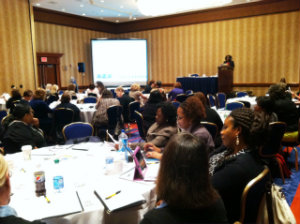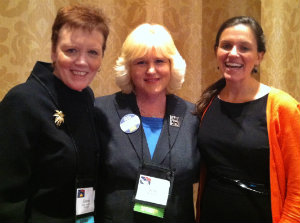 This year's ACES faculty sessions were strictly standing room only.
This year's ACES faculty sessions were strictly standing room only.New nurses need to be competent in the care they provide to older adults. Yet nursing faculty may lack geriatric preparation and may not be comfortable teaching the content.
ACES—or Advancing Care Excellence for Seniors—is a national program led by the National League for Nursing and Community College of Philadelphia aimed at addressing this important issue.
The ACES Program prepares faculty in pre-licensure nursing programs to teach gero-focused content to ultimately enable nursing students with skills and competence to care for older adults. Nursing faculty strive to be excellent. ACES provides the necessary resources to teach about aging, geriatric care and complexity through the ACES framework, innovative geriatric case studies for simulation, geriatric teaching strategies, a test bank of questions for faculty, and opportunities to attend in-person ACES conferences.
The ACES effort was established in 2006 through a partnership between the John A. Hartford Foundation, the Independence Foundation, and Laerdal Medical (makers of SimMan). This partnership was strengthened with the addition of The Hearst Foundations, Independence Blue Cross and the Alzheimer's Association. Standards, curricula, and educational opportunities have been provided to more than 8,000 nursing faculty.
Earlier this month, I had the great pleasure of both attending and serving on the faculty of the ACES conference at National League for Nursing’s Annual Summit in Washington, DC. The sessions were oversubscribed, standing room only! It is heartwarming and professionally reaffirming to see that faculty want this content. It offers value to them and their students. The content was rich as was the level of faculty engagement in local implementation of the resources. Yes, ACES continues to spread and gather steam.
It was particularly exciting to see the enhancements provided by the Hearst Foundations. With Hearst’s support, ACES has expanded its state-based implementation within nursing schools. And, in order to recognize and showcase innovative exemplars, this year the conference featured the Hearst Foundations’ Excellence in Geriatric Education Awards.
The six nursing programs honored were: MiraCosta College (CA), Iowa Western Community College (IA), Minnesota State University Mankato School of Nursing (MN), University of North Carolina at Greensboro (NC), Mount Carmel College of Nursing (OH), and the Breen School of Nursing, Ursaline College (OH). Each school presented innovative efforts, practical tips and a measure of their own “secret sauce”—all important components to successful implementation of geriatrics in nursing education.
The excitement did not stop there. Laerdal Medical, a partner in the grant and leader in the use of simulation in nursing education, is spreading the ACES Cases by pre-loading these geriatric simulations on SimPads. The SimPad computer is the control center used by most nursing programs to run simulation exercises that give students a chance to experience complex care and apply new knowledge.
“Millie” was the first of the ACES Cases. Based on the success of the ACES Cases, the National League for Nursing has been funded by Laerdal Medical in partnership with the Department of Veterans Affairs to expand to ACES-V, simulation in care of our nation’s veterans. This work is underway and the new ACES-V Cases will be “vetted” (I could never resist a good pun) by VA nurses, veterans, and their families.
This is a story with a happy lack of an ending. The Hartford Foundation was one of three funding partners that began this work back in 2006. Our total support for ACES exceeded $1.2 million, a substantial investment. The Independence Foundation has provided nearly $1.4 million and Laerdal added an additional $300,000. Independence Blue Cross joined in with a generous award of $180,000.
The Hartford Foundation's funding ended in 2011, just as the Hearst Foundation came on with an award of $1.2 million to significantly expand the work. And based on the success of the ACES Cases, Met Life has added $125,000 for Alzheimer's Cases and Laerdal Medical gave $100,000 for the ACES Cases for Veterans.
 From left, Elaine Tagliareni, NLN's chief program officer; Amy Berman; and Sarah Thompson Mishurov, The Hearst Foundations' program strategy manager.
From left, Elaine Tagliareni, NLN's chief program officer; Amy Berman; and Sarah Thompson Mishurov, The Hearst Foundations' program strategy manager.None of this would be possible without the expert leadership of Elaine Tagliareni, chief program officer for the National League for Nursing. Elaine launched ACES while on faculty at Community College of Philadelphia (CCP) and continues to be supported by CCP’s outstanding program director, Barbara McLaughlin, and faculty, including Andrea Mengel, Tamika Curry and Laureen Tavolaro-Ryley. Warm thanks go to Susan Sherman, president of the Independence Foundation, and Eunice King, senior program officer and director of research and evaluation.
Independence has been a thought partner since the work’s inception and Eunice has been the project evaluator helping us to understand the effort’s impact. Clive Patrickson, CEO of Laerdal, was directly involved in the early development of the innovative ACES Cases now used in simulation teaching around the country. Special thanks to the team at the Hearst Foundations for the strategic expansion of ACES.
And last, but certainly not least, our thanks go to Beverly Malone, CEO of the National League for Nursing. She has been a strong champion and continues to recognize the ACES work and all the partners involved in this important effort in her Summit opening remarks. Together, this team is spreading ACES faces and cases to new places.
